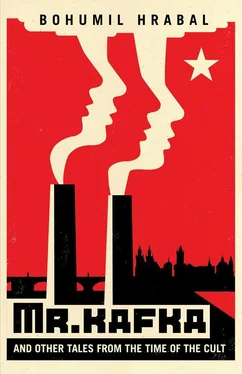The white-gowned doctor washes his hands. “Are you a believer, young lady?” he asks.
“Yes, but doctor…”
“Well, then, young lady, you must believe. Concentrate, pray, believe with all your might, because my science is no longer of any use.”
He washes his hands and avoids her eye, for why get upset? Does the doctor know that at this very moment, or an hour from now, certainly by this evening at the latest, a trap somewhere will snap shut and an ambulance will arrive to gather the prey? There will always be a trusting newbie who fails to get a proper grip on the red-hot wire with his pliers, or the tongs fly apart and kick him, or he bungles the extrusion of hot wire and sixteen meters of fiery filament spins into the air and the rollers leap out of the way or take shelter under the rolling bench, but sometimes a loop of it touches the newbie’s neck and forces him to dance a dance for his buddies in the finishing room, his dance a variation on the statuary of Laocoön and his sons, in which minimal contact elicits maximum pain, and if the thirsty filament doesn’t sear his jaw, it will char his cheek bones; if it doesn’t burn through his clavicle, it will scorch the fingers that try to remove this cup from his lips and in the end, the newbie’s head drops, his lips are fused together in an eternally malodorous kiss, and through the seared collarbone the spirit unlocks its torture chamber and beautiful Poldi grows fatter. Young men in the fiery furnace. And yet when the wounds heal and they go back to work, these volunteer laborers are bettering everything on life.
“Hey, Annie, if I had a guy like that at home? I’d grease the stairs, kick his butt, and send him flying, I swear by the blessed Virgin, I would.”
“So the Captain says, ‘Everyone get out of the boat and push!’”
“Who’s he telling that to? Who’s he talking to? Did anyone on this bus ask him? No one. Aha! Hector’s licking his ice-cream bar. But we’re doing him wrong. He’s not stupid, he’s just a little thick.”
“So what? Either you get run over in Prague, or here.”
“See that? Hear that? He’s talking to himself. He’s got his wires crossed. When it comes to thinking, he’s walking on his hands.”
“Miss, hold that pose. It’s as if you were alive.”
“My grandmother? She could still piss without her glasses on right into her nineties.”
“Driver, step on it, or they’ll declare you missing in action. I want to get back in time to go to the movies tomorrow.”
“Ooo, careful, here comes a crossroads! Better get a notarized certificate that nothing’s coming the other way!”
“If the driver went for cherries, he’d come back with plums.”
“I had chicken soup at Hunecks, but there were teeth marks in the thigh from the previous customer. The goddamned chicken probably played soccer all her life for the local eleven and then died of old age.”
“I’m going to sit beside you.” “Please don’t, I’m not insured.”
“When the old gal wouldn’t fit in the coffin, we broke her legs.”
“It’s all a matter of contingencies. If elephant grass started growing ten meters high, we’d have the dinosaurs back in three days.”
“For God’s sake, Blazka, get your ass out of my face!”
“Ever since their place got burgled, they’ve been fond of each other.”
“But I want to know who’s guilty! Just don’t blame it on the Bible.”
“It was enemas that brought me and my wife together. We have some splendid secrets.”
“Today, when they tell me to jump in the lake, I jump in the water.”
“Of course she’s not a woman! She’s an out-and-out cow.”
“In the name of decency, comrades, would you please speak politely on this bus?”
“František, you’re completely out to lunch! Wine has to mature in the barrel. It will never ripen in bottles.”
“Okay, say you cut off a girl’s pigtail as a prank. That’s not an insult to her dignity, it’s a crime. It’s an invasion of her personal space.”
“Merciful heavens, I wish you actuaries would actually finish at least one game of mariáš .”
“Poldi Recreation Centre! Koněv Spa! Everyone off the bus!”
Among other things, beautiful Poldi is tar pits and slag heaps and barracks and dormitories. Barbed wire separates the steel works from fields of undulating grain and vegetable gardens. The smell of stale urine wafts through the open windows of the dormitory, where sleepers sleep in layers on makeshift bunks, exactly as they’d fallen asleep after their night shifts, their forearms exposed to receive injections of light. Hirsute men with broken spines and crippled hands play cards, lending a frenzied authority to their loud banter. It’s as though the entire camp were on the alert, waiting for something fundamental to happen: a knock on the door, the sound of a voice, something that would instantly render everyone good and beautiful. From outside comes the strident clamor of slogans over a loudspeaker and an accordion optimistically paints cheap color prints. And yet there is not a single flower on the laborers’ table, not one little bouquet for the world to lean on.
From where I’m standing in the dormitory doorway, the corridor is so long I can barely see to the door at the other end. When I’ve walked the length of it and turned around, the doorway I’ve come from is no bigger than a tiny window. A barracks like this is a rattrap sprung shut by a perspective constantly narrowing at either end. The old attendant who brought me here grows smaller and smaller as he walks down the corridor, until he’s tiny: a figurine standing in that apparently miniature window at the end of the hall. When I opened the door to the dormitory, the air was alive with rings and golden squares, as though someone had been playing carelessly with shrapnel. The only unbroken things in the room were two mustard jars. The padlocks on the lockers were as twisted as arthritic fingers. Then, a volunteer laborer came up to me and said his name was Jarda Jezule, a furrier. In one hand he held a small suitcase, and in the other the Collected Works of Karl Marx. Beside him was a broken stove with the stovepipe sticking out of the wall like a huge piece of excrement oozing from a music-hall giant. Jarda Jezule sat down on an upper bunk, and I lay on the bed beneath. He took off a boot and a sock, and his feet were tiny, red from scarlet fever, withered and wrinkled like the soles of a Chinese girl’s foot or the inside of a bulldog’s mouth. He massaged his toes to get the blood moving again, then he stuffed newspapers in the toes of his boots and as he did so, he dangled his feet in my face. I lay on the bunk below as if in a river where the furrier was dipping his feet. Meanwhile, the camp echoed with voices calling out to each other. The aroma of the washroom and the toilets seeped through the wall. The languid sounds of a music box drifted in from a playground, and through the window you could see, across the way, another dormitory, just as big, the buildings laid out like a military hospital.
Beautiful Poldi, however, is also the path that leads away from the dormitories, past a black pond where an electric pump spews out a stream of water. In the pond, a gypsy woman stands on a stone next to a rusty stove and a half-submerged bicycle, washing her ragged clothes. Jarda Jezule and I walk this way to the Black Horse to play the piano and drink rum. The Collected Works are under the bed, but we’re in no state to read. After all, during a single shift at the blast furnace we drank twenty beers and peed scarcely a cupful. With the last of our money, we shoot for plastic roses at the shooting gallery. Then we walk back. The female convicts are already in their dorms, housed in barracks separated from ours by a board fence topped with barbed wire. Only today I noticed, through a knothole in the fence, that these female prisoners live in a tidy place with clean tablecloths and bouquets of meadow flowers, while we who are free live in a pigsty. One of the prisoners is a stunning beauty who threw her mother down a well, and when the mother clawed her way back up to the light, that gorgeous young woman split her head open with an axe. Two of the volunteer laborers tried to reach the murderess by climbing over the fence, but the guards caught them just as they were trying to touch her, and they got slapped around and were given three months each in jail. At the rolling mill I handed her a flower. It was as though the murder and the punishment had purified her, and today she could be leading a proper life, with tablecloths, flowers, and kind words. When she took a bath each evening, every knothole in the fence was occupied by a laborer’s eye. She was covered in soft, fine hair, a light golden down, as if her entire body were wrapped in a halo. When she soaped herself, she would pause to daydream and stand in odd poses. We tried in vain to make telescopes of our eyes, while the stronger men pushed the weaker ones away from the knotholes. I could see that she knew every eye in every knothole and that she’d come to expect them and that she bathed naked for the sake for those longing male gazes, which, for her, took the place of a stroll along the boulevard in the evening. But what devastated the laborers most of all was not her naked body, but the shadow play she put on in the dormitory by her bed. She would hang a sheet in the window and position a lightbulb to cast the shadow of her lascivious movement against the sheet. It was like watching a movie. We’d all jump up and down on the other side of the fence, crawl up to the barbed wire, fall back down again, pick ourselves up, but as soon as we fixed our eyes to the knot holes again and saw the shadow play, we were climbing up the fence again, trying to get over it and into that bird cage, because that beautiful, naked prisoner would reach out to us with her shadowy arms and there was so much desire in her movements that each man thought she was reaching out just for him, to each of us, one by one. Then, when she reckoned she’d toyed with us enough, she’d put on a sweatsuit, take down the sheet, make her bed, and lie down on her bunk like the others, light a cigarette, put her arms behind her damp head, and read a cheap romance novel. We’d go back to our barracks, leaving behind the still-illuminated women’s dorm with its female prisoners, who put bouquets of cornflowers and wild poppies on every table. But at a barred washroom window, a half-mad female prisoner rested her head on the windowsill, listening to the sounds of “The Harlequin’s Millions” coming from the music box in the shooting gallery. A teardrop glittered like a diamond in the ring of her eye. When they’re at the bottom, people fill their eyes with beautiful things. The world is full of art, it’s just a matter of knowing how to look around you and then surrendering to inexhaustible whisperings, to small details, to longing and desire.
Читать дальше












